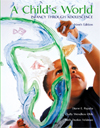 |  A Child's World: Infancy through Adolescence, 9/e Diane E. Papalia,
University of Wisconsin-Madison
Sally Wendkos Olds
Ruth Duskin Feldman
Psychosocial Development during the First Three Years
Chapter Overview
Chapter 8 begins the exploration of psychosocial development with themes that
continue, with variations, at each stage of childhood. In this chapter, the authors:
Report what is known about infants' emotions and how they show these emotions
Discuss the early influences of temperament and the family
Present Erikson's theoretical perspectives on the development of trust, the
"crisis" of infancy, and autonomy, the "crisis" of toddlerhood.
Describe research on the development of attachment, of emotional communication
with caregivers, of stranger anxiety and separation anxiety, and of social referencing.
Explore developmental issues of toddlerhood, including the emergence of the
sense of self, internalization of societal rules, and the origins of conscience.
Describe interactions with siblings and other children
Assess the impact of early day care on cognitive, emotional, and social development,
and identify characteristics of high quality day care |
|



 2002 McGraw-Hill Higher Education
2002 McGraw-Hill Higher Education